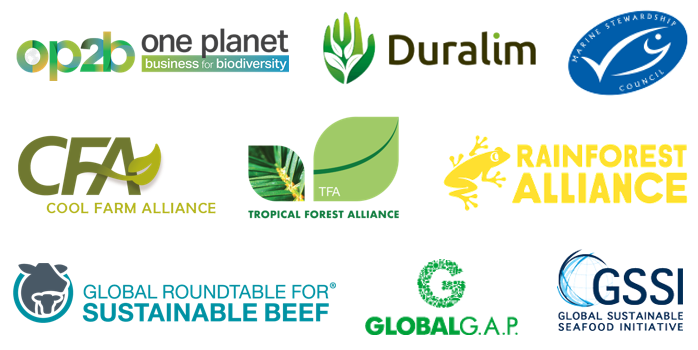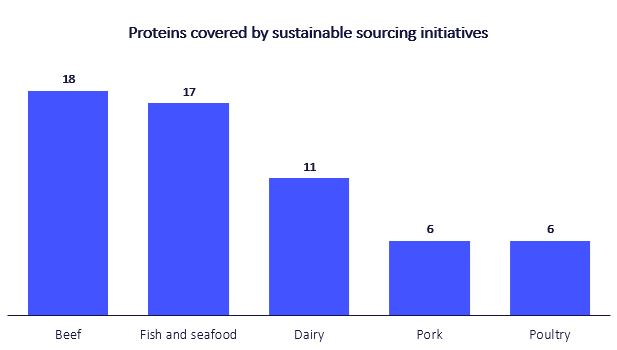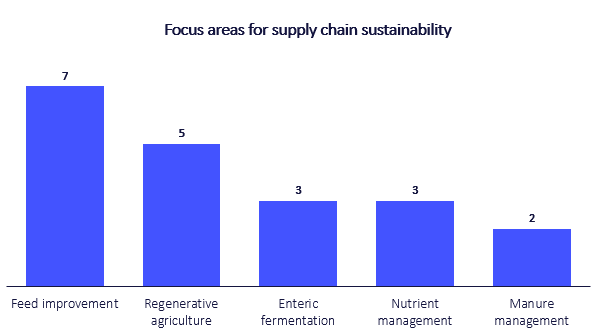The Growing Reach of Responsibility
With concern rising over greenhouse gas emissions, species extinction and environmental destruction, global supply chains have come under growing scrutiny. From animal feed cultivation to land-use change; soil erosion to water pollution; the methane emissions created by ruminant livestock, to the pollution generated by poor manure management: the environmental impacts caused by industrial animal farming occur across the entire value chain.
These are significant and pose material risks – and companies are increasingly recognising extended responsibility beyond their direct operations.
With investors and civil society organisations alike demanding strategic and coordinated action, it is a welcome development that stakeholders are working pre-competitively on supply chain sustainability.
Sustainability Initiatives in Action: Findings from FAIRR’s Sustainable Proteins Engagement
Across the 25 companies in the FAIRR Sustainable Proteins engagement, we identified at least 28 unique sustainable sourcing initiatives, partnerships, or certifications. Most commonly, companies were involved with the Marine Stewardship Council (13 companies) and Aquaculture Stewardship Council (5). Other recurring initiatives included the One Planet Business for Biodiversity initiative (5), the Global Sustainable Seafood Initiative (4), and 6 companies with individual partnerships with WWF.
Example initiatives identified through FAIRR’s Sustainable Proteins engagement.

Sustainability initiatives are not universal across protein supply chains. Beef, fish, and seafood are the most covered proteins, while pork and poultry are the most neglected by existing initiatives. This is likely because cows are well-known as the most highly-emitting farmed animal, and there is a direct link between fishery sustainability and supply volumes. There is less scrutiny of the environmental impacts of pork and poultry – though, in recent months, there has been increased attention to pollution from manure in poultry operations.

Within supply chain efforts, feed improvement was the most commonly cited focus area, with 7 of 25 making explicit reference to this area of activity. Other production improvements include integrating regenerative agricultural practices and focussing on reducing methane from enteric fermentation.

Evaluating Impacts: Questions for Investors
More transparency and scrutiny are needed to understand the impacts of sustainable sourcing initiatives. Below are key questions to consider when analysing company participation in such initiatives – looking at their scope, mandate, governance, implementation, and efficacy.
What | – Are there clearly defined objectives? – How have objectives been defined? And by which stakeholders? |
Why | – Why is the initiative needed? – What has led to its creation? – What is the evidence base for action? – What is the defined mission/purpose? |
Who | – Do the parties involved have influence and the ability to effect change? – Are key players in the supply chain – e.g. by market share – not participating? – Is the initiative run or governed solely by industry players? How does this impact ambitions and outcomes versus including independent scientists, experts, communities, and other stakeholders? |
Where | – What markets/regions are covered? |
How | – What are participants required to do? – How are participants working together? – How is the initiative governed? – How can stakeholders and third parties trust that members are acting or complying with standards? What are the monitoring, reporting and grievance mechanisms? |
When | – Is the Initiative time-limited or an ongoing collaboration? Why? |
Wins | – How do achievements to date compare to the scale of the issue? – Has significant progress been made? In what time frame? |
Without accessible answers to these questions, there is a considerable risk of greenwashing. A company disclosing its participation in an initiative as part of its annual reporting is a positive step – but it is not sufficient evidence of meaningful action. The commitments and actions that the company has taken must be disclosed and understood.
Sustainable Sourcing: a Step, Not a Solution
Sustainable sourcing initiatives are a needed development, but their benefits and limitations must be clearly understood. Regulation, rather than voluntary initiatives, may still be necessary where true governance gaps exist – for example where supply chains interact with illegal deforestation, or manure significantly pollutes waterways.
What is more, improvements to existing supply chain sustainability must be accompanied by other shifts for a truly sustainable food system. This includes transitioning product portfolios and reaching sustainable levels of protein consumption – facts which underpin the need for protein diversification, and FAIRR’s Sustainable Proteins engagement.
The FAIRR Initiative will continue to develop its work on sustainable sourcing initiatives in protein supply chains. This research will be housed in the Sustainable Proteins Hub, where you can uncover more on companies’ supply chain strategies.
Next on the Menu
In next week’s instalment, FAIRR will be exploring the importance of Scope 3 target setting for food retailers and manufacturers worldwide. A company’s Scope 3 emissions will often exceed the combined total of its direct operations (Scope 1 and 2). Achieving an emissions output that keeps us in line with a 1.5-degree scenario under the Paris Agreement will, therefore, require a much more rigorous approach to monitoring, reporting and mitigating the impact of GHG emissions. Stay tuned for more!
FAIRR insights are written by FAIRR team members and occasionally co-authored with guest contributors. The authors write in their individual capacity and do not necessarily represent the FAIRR view.











